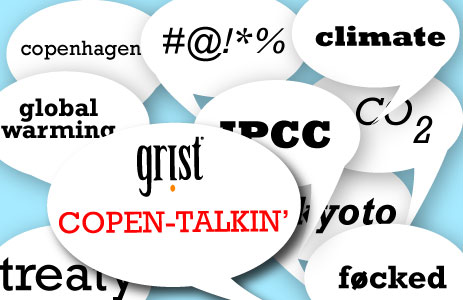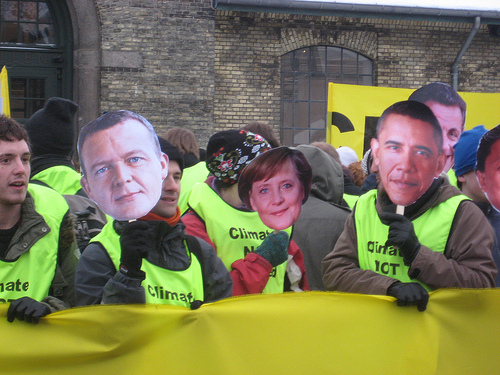An insufficient deal has been struck at Copenhagen, leaving many participants dismayed by the outcome and miffed at President Obama. Resentment toward Obama had been building throughout the day, and it spilled over as I went looking for food.
After buying a plate of lentils at a cafeteria inside the Bella Center, I sat down at a round plastic table occupied by three European journalists — a German, a Brit, and a Dane.
“What do you have to say for your president?” the German demanded, nursing his third beer.
Come again?
“Why would he fly all the way here for such a miserable performance? What a disaster. What a gross and shocking disappointment. He was our only hope, and look at what he’s done. He should have stayed home. That would have been the honest thing to do, rather than pretending he had something — anything! — to offer.”
I tossed out counter-arguments as the invectives flew:
“What about the $100 billion commitment?” I said.
“That was just following the herd,” came the retort. “Europe and the U.K. already offered that.”
“Seventeen percent by 2020 for a country that has set no limits at home,” I rejoined.
“It’s peanuts — 4 percent below 1990 levels.”
And so it went — an outpouring of anger and grief.
“I feel like he’s my president,” confessed the Brit as the others nodded, “and he betrayed me.”
There’s no question that the tentative deal falls severely short. It’s hardly the broad-based accord with tough mitigation, financing, and transparency provisions that activists had hoped for. The outcome certainly does not appear to merit bringing 190 countries together under the U.N. framework; much of this could probably have been hashed out over the phone.
But our disappointment in Obama is for the most part unrealistic. The European reporters I met wanted Obama to lead their nations–lead the world–when in reality he leads a country whose progress on climate change is many steps behind the developed world.
 I try to think from the perspective of the large segment of Obama’s constituency who still feel a lot of doubt and confusion around the climate issue. Fully 55 percent of Americans surveyed in a recent Washington Post-ABC poll disagree with the way Obama is handling the climate issue, concerned that he is moving too far too fast. The way to go about bringing this constituency and the American Congress up to speed on climate change is not by taking a flying leap way out ahead of them.
I try to think from the perspective of the large segment of Obama’s constituency who still feel a lot of doubt and confusion around the climate issue. Fully 55 percent of Americans surveyed in a recent Washington Post-ABC poll disagree with the way Obama is handling the climate issue, concerned that he is moving too far too fast. The way to go about bringing this constituency and the American Congress up to speed on climate change is not by taking a flying leap way out ahead of them.
Obama has been so deified — by the European journalists I met as well as millions of others around the world — that we fail to recognize his limitations. Already Obama has moved ahead of Congress on the climate issue. If he had gone much further, it would very likely have backfired, resulting in a Kyoto-like scenario where the U.S. Congress intervenes and obstructs further progress, domestically and globally. There’s an argument that even Obama’s role in the mediocre agreement announced today could trigger a backlash by itself, inflaming political tensions in Washington and hobbling efforts to move climate legislation through the Senate this spring.
Instead of directing our frustrations at Obama, let’s direct them at the paralysis of vision and understanding among the American people. The way to get meaningful progress on climate change is to build momentum from the ground up. Obama isn’t going to save us; we’re going to have to save ourselves — and in the process, Obama.
Check out our comprehensive coverage of what the føck is going on in Copenhagen, or track the latest from Grist on our Facebook page or the @grist Twitter feed.




